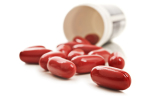- FreeTrainers.com Forums
- Health Supplements
- creatine and water intake
Group: Health Supplements
Created: 2012/01/01,
Members: 102,
Messages: 16613
Supplements can be a great aid with your health and fitness goals. Combined with the proper exercise and nutritional plan they can be quite effective.
Join group
creatine and water intake

hey_yoda
Posts:
36
Joined: 2002/10/03  |
2002/11/04, 02:21 AM
How much water should you be drinking when taking creatine? |
|
| |

jbennett
Posts:
1,558
Joined: 2001/02/28  |
2002/11/04, 12:42 PM
Regardless of whether you're taking creatine or not, you should drink at least a gallon a day (not a one time, of course). This may cause you to hang out in the restroom more often, but its worth it. Water plays a major part in maintaining an anabolic environment in your body -- anabolic environment = growth. Just be sure you are replenishing your electrolites throughout the day, as some of them will be flushed out of your body by the water.-------------- --JBennett "I've up-ed my intensity.... now up yours!" "Pain is only weakness leaving the body." "Never think of how weak you are; think of how strong you're going to be." |

hey_yoda
Posts:
36
Joined: 2002/10/03  |
2002/11/04, 01:47 PM
Wow! A whole gallon? That's insane! I'm not drinking anywhere near that much... Well at least now I know. And what exactly do you mean by "electrolites" ?Thanks! |

Carivan
Posts:
8,542
Joined: 2002/01/20  |
2002/11/04, 03:12 PM
Also we don't think we are dehydrated but we are if we have dry skin, dandruff, itchy nose, all come from not enough water, but the doctors will never tell you that.I drink about 4 ltrs a day. -------------- To change it, or to create it, simply train it! |

jbennett
Posts:
1,558
Joined: 2001/02/28  |
2002/11/04, 10:12 PM
Here's some info on electolytes (I spelled it wrong in my last post). Its taken from WebMD.com------- electrolyte (e-lek´tro-lït) -- a chemical substance which, when dissolved in water or melted, dissociates into electrically charged particles (ions), and thus is capable of conducting an electric current. The principal positively charged ions in the body fluids (cations) are sodium (Na+), potassium (K+), calcium (Ca2+), and magnesium (Mg2+). The most important negatively charged ions (anions) are chloride (Cl-), bicarbonate (HCO3-), and phosphate (PO43-). These electrolytes are involved in metabolic activities and are essential to the normal function of all cells. Concentration gradients of sodium and potassium across the cell membrane produce the membrane potential and provide the means by which electrochemical impulses are transmitted in nerve and muscle fibers. The concentration of the various electrolytes in body fluids is maintained within a narrow range. However, the optimal concentrations differ in the extracellular fluid and intracellular fluid. For example, the concentration of sodium in extracellular fluid (serum) is about 15 times higher than in the intracellular fluid. Conversely, the concentration of potassium is about 30 times higher within the cell than in the serum or extracellular fluid. An electrolyte imbalance exists when the serum concentration of an electrolyte is either too high or too low. The terms for excessive and deficient blood levels of electrolytes are derived from the Greek prefixes hyper- (over) and hypo- (under), the English or Latin name of the electrolyte, and the Latin suffix -emia. For example, if there is an excess of sodium (Latin, natrium) cations in the serum, the condition is referred to as hypernatremia. A deficit of these ions is called hyponatremia. Stability of the electrolyte balance depends on adequate intake of water and the electrolytes, and on homeostatic mechanisms within the body that regulate the absorption, distribution, and excretion of water and its dissolved particles. Many conditions can interfere with these processes and result in an imbalance. For example, renal disease, in which the kidney nephron is unable to function normally, causes a retention of water, sodium, chloride, bicarbonate, and calcium as the glomerular filtration rate falls. Even when the kidney structures are intact, electrolyte imbalances can result from an inadequate supply of blood to the nephrons or from imbalances of regulatory hormones, such as aldosterone and antidiuretic hormone (ADH). CALCIUM - The effects of an electrolyte imbalance are not isolated to a particular organ or system. In general, however, imbalances in calcium concentrations affect the bones, kidney, and gastrointestinal tract. Calcium also influences the permeability of cell membranes and thereby regulates neuromuscular activity. SODIUM affects the osmolality of blood and therefore influences blood volume and pressure and the retention or loss of interstitial fluid. POTASSIUM affects muscular activities, notably those of the heart, intestines, and respiratory tract, and also affects neural stimulation of the skeletal muscles. -------------- --JBennett "I've up-ed my intensity.... now up yours!" "Pain is only weakness leaving the body." "Never think of how weak you are; think of how strong you're going to be." |

Carivan
Posts:
8,542
Joined: 2002/01/20  |
2002/11/04, 10:18 PM
Good Info jbennett.Always learning! -------------- To change it, or to create it, simply train it! |

littlebadjohn
Posts:
3
Joined: 2003/10/02  |
2003/10/02, 11:13 PM
That info on electrolytes is very helpful, also I am looking to learn the different types of body structures so I can see what is to be expected in my growth and development. Any help is appreciated. I am 5' 10" and 208 lbs. 26 years of age. BMI is like 28 or so.
|
